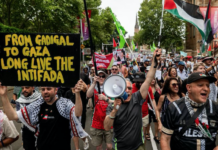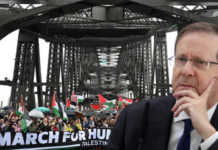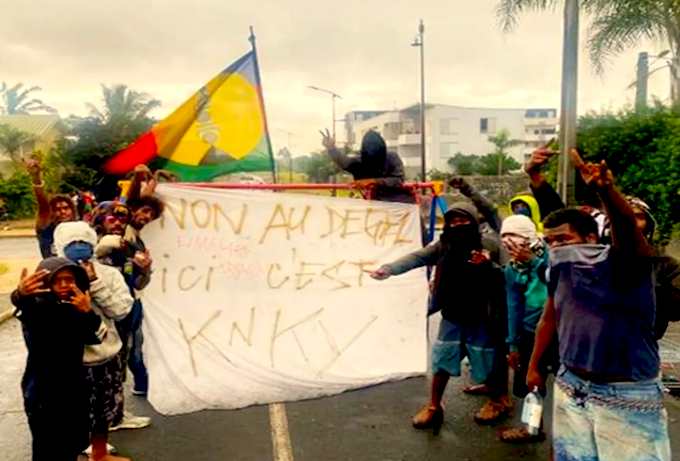
ANALYSIS: By Patrick Decloitre, RNZ Pacific c
French President Emmanuel Macron has declared a state of emergency in New Caledonia after several days of civil unrest in the capital.
Four people are dead due to the unrest and violence in the capital, Nouméa.
France TV reports that a 22-year-old gendarme who had been seriously wounded has become the fourth death. The other three were reportedly Kanaks killed by vigilantes.
- LISTEN TO RNZ MORNING REPORT: Tourists stuck in New Caledonia as riots continue
- Period of instability on cards for New Caledonia, says former Australian consul-general
- READ MORE: Nouméa ‘was on fire’ – New Zealander in New Caledonia tells of unrest
France declares state of emergency in New Caledonia – four die in riots - Other Kanaky New Caledonia crisis reports
Macron posted on X, formerly Twitter, a message saying the nation was thinking of the gendarme’s family.
Hundreds of others have been injured with more casualties expected as French security forces struggle to restore law and order in Nouméa amid reports of clashes between rioters and “militia” groups being formed by city residents.
According to local media, the state of emergency was announced following a defence and national security council meeting in Paris between the Head of State and several government members, including the Prime Minister and ministers of the Armed Forces, the Interior, the Economy and Justice.
In a press conference last evening in Nouméa, France’s High Commissioner to New Caledonia, Louis Le Franc, told reporters he would call on the military forces if necessary and that reinforcements would be sent today.
Local leaders called for state of emergency
The state of emergency declaration came after the deteriorating crisis on Wednesday prompted Southern Province President Sonia Backès to call on President Macron to declare an emergency to allow the army to back up the police.
“Houses and businesses are being burnt down and looted — organised gangs are terrorising the population and putting at risk the life of inhabitants,” Backes said.
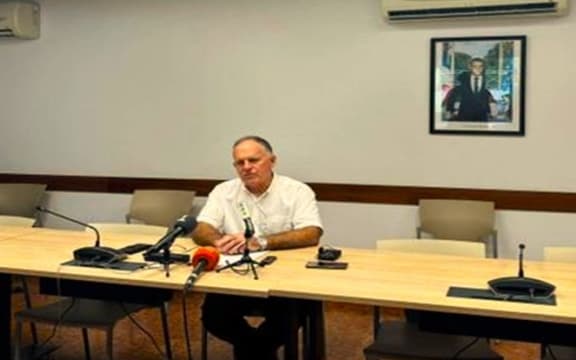
“Law enforcement agents are certainly doing a great job but are obviously overwhelmed by the magnitude of this insurrection . . . Night and day, hastily formed citizen militias find themselves confronted with rioters fuelled by hate and the desire for violence.
“In the next few hours, without a massive and urgent intervention from France, we will lose control of New Caledonia,” Sonia Backès wrote.
She added: “We are now in a state of civil war.”
Backès was later joined by elected MPs for New Caledonia’s constituency, MP Nicolas Metzdorf and Senator Georges Naturel, who also appealed to the French President to declare a state of emergency.
“Mr President, we are at a critical moment and you alone can save New Caledonia,” they wrote.
More than 1700 law enforcement officers deployed
During a press conference on Wednesday evening, French High Commissioner Louis Le Franc said two persons had died from gunshot wounds and another two were seriously injured during a clash between rioters and a local “civil defence group”.
He said the gunshot came from one member of the civil defence group who “was trying to defend himself”.
Other reliable sources later confirmed to RNZ the death toll from the same clash was at least three people.
High Commissioner Le Franc said that in the face of an escalating situation, the total number of law enforcement personnel deployed on the ground, mainly in Nouméa, was now about 1000 gendarmes, seven hundred police, as well as members of SWAT intervention groups from gendarmerie (GIGN) and police (RAID).
Le Franc said that a dusk-to-dawn curfew had been extended for another 24 hours.
“People have to respect the curfew, not go to confrontations with weapons, not to burn businesses, shops, pharmacies, schools.”
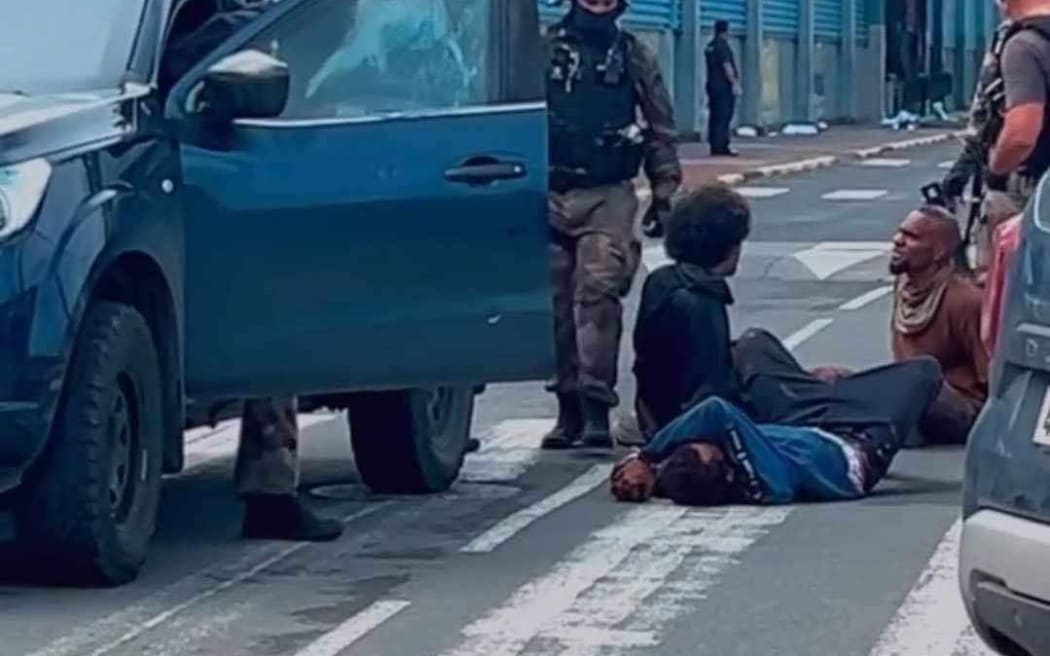
Armed groups formed on both sides
All commercial flights to and from the Nouméa-La Tontouta international airport remained cancelled for today, affecting an estimated 2500 passengers to and from Auckland, Sydney, Brisbane, Nadi, Papeete, Tokyo and Singapore.
The situation on the ground is being described by local leaders as “guerrilla warfare” bordering on a “civil war”, as more civilian clashes were reported yesterday on the outskirts of Nouméa, with opposing groups armed with weapons such as hunting rifles.
“We have now entered a dangerous spiral, a deadly spiral . . . There are armed groups on both sides and if they don’t heed calls for calms — there will be more deaths,” French High Commissioner Louis Le Franc warned.
“I sense dark hours coming in New Caledonia . . . The current situation is not meant to take this terrible twist, a form of civil war.”
Le Franc said if needed, he would call on “military” reinforcements.
Also yesterday, a group of armed rioters heading towards Nouméa’s industrial zone of Ducos, prompted an intervention from a RAID police squad.
As Nouméa residents woke up today the situation in Noumea remained volatile as, over the past 24 hours, pro-France citizens have started to set up “civil defence groups”, barricades and roadblocks to protect themselves.
Some of them have started to call themselves “militia” groups.
Political leaders call for calm
On the political front, there have been more calls for calm and appeasement from all quarters.
After New Caledonian territorial President Louis Mapou appealed on Tuesday for a “return to reason”, the umbrella body for pro-independence political parties, the FLNKS, yesterday also issued a release appealing for “calm and appeasement” and the lifting of blockades.
While “regretting” and “deploring” the latest developments, the pro-independence umbrella group recalled it had called for the French government’s proposed amendment on New Caledonia’s electoral changes to be withdrawn to “preserve the conditions to reach a comprehensive political agreement between all parties and the French State”.
“However, this situation cannot justify putting at risk peace and all that has been implemented towards a lasting ‘living together’ and exit the colonisation system,” the FLNKS statement said.
The FLNKS also noted that for the order to be validated, the controversial amendment still needed to be put to the vote of the French Congress (combined meeting of the Assembly and the Senate) and that French President Macron had indicated he would not convene the gathering of both Houses of the French Parliament immediately “to give a chance for dialogue and consensus”.
“This is an opportunity FLNKS wishes to seize so that everyone’s claims, including those engaged in demonstrations, can be heard and taken into account,” the statement said.
The President of the Loyalty Islands province, Jacques Lalié (pro-independence) on Wednesday called for “appeasement” and for “our youths to respect the values symbolised by our flag and maintain dignity in their engagement without succumbing to provocations”.
“Absolute priority must be given to dialogue and the search for intelligence to reach a consensus,” he said.
Paris vote which sparked unrest
Overnight in Paris, the French National Assembly voted 351 in favour (mostly right-wing parties) and 153 against (mostly left-wing parties) the proposed constitutional amendments that sparked the ill-fated protests in Noumea on Monday.
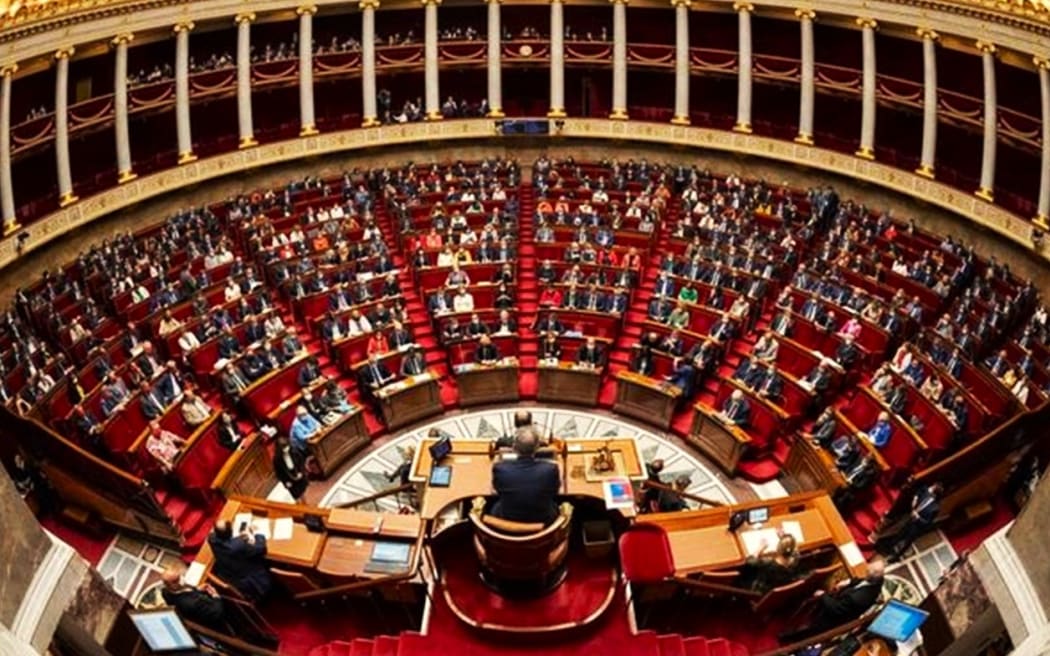
This followed hours of heated debate about the relevance of such a text, which New Caledonia’s pro-independence parties strongly oppose because, they say, it poses a serious risk and could shrink their political representation in local institutions (New Caledonia has three provincial assemblies as well as the local parliament, called its Congress).
New Caledonia’s pro-independence parties had been calling for the government to withdraw the text and instead, to send a high-level “dialogue mission” to the French Pacific archipelago.
The text, which is designed to open the restricted list of voters to those who have been residing in New Caledonia for an uninterrupted 10 years, has not completed its legislative path.
After its endorsement by the Senate (on 2 April 2024, with amendments) and the National Assembly (15 May 2024), it still needs to be put to the vote of the French Congress (a joint sitting of France’s both Houses of Parliament, the National Assembly and the Senate) and obtain a required majority of 60 percent.
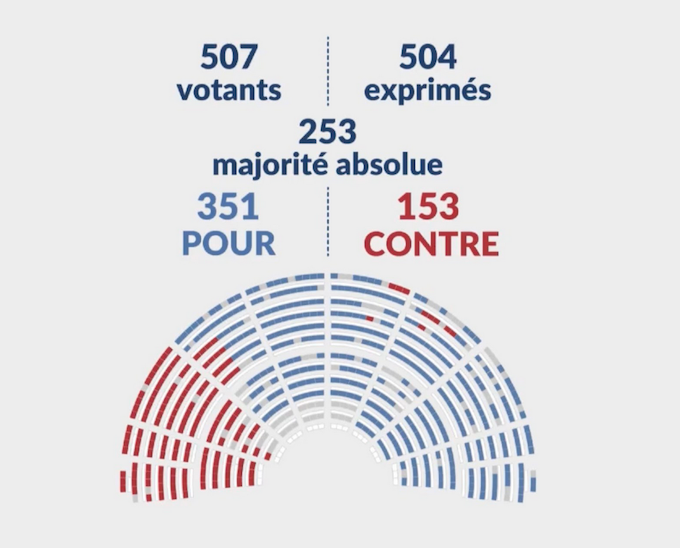
The bigger picture
The proposed constitutional amendments were tabled by the French Minister for Home Affairs and Overseas, Gérald Darmanin.
Darmanin has defended his bill by saying the original restrictions to New Caledonia’s electoral roll put in place under temporary measures prescribed by the 1998 Nouméa Accord needed to be readjusted to restore “a minimum of democracy” in line with universal suffrage and France’s Constitution.
The previous restrictions had been a pathway to decolonisation for New Caledonia inscribed in the French Constitution, which only allowed people who had been living in New Caledonia before 1998 to vote in local elections.
Those principles were at the centre of the heated discussions during the two days of debate in the National Assembly, where strong words were often exchanged between both sides.
More than 25 years after its implementation, the Accord– a kind of de facto embryonic Constitution for New Caledonia — is now deemed by France to have reached its expiry date after three self-determination referendums were held in 2018, 2020 and 2021, all resulting in a rejection of independence, although the last vote was highly controversial.
The third and final referendum — although conducted legally — was boycotted by a majority of the pro-independence Kanak political groups and their supporters resulting in an overwhelming “no” vote to Independence from France, a stark contrast to the earlier referendum results.
Results of New Caledonia referenda
- 2018: 56.67 percent voted against independence and 43.33 percent in favour.
- 2020: 53.26 percent voted against independence and 46.74 percent in favour.
- 2021: 96.5 percent voted against independence and 3.5 percent in favour. (However, However, the third and final vote in 2021 — during the height of the covid pandemic — under the Nouméa Accord was boycotted by the pro-indigenous Kanak population. In that vote, 96 percent of the people voted against independence — with a 44 percent turnout.)
Since the third referendum was held, numerous attempts have been made to convene all local political parties around the table to come up with a successor pact to the Nouméa Accord.
This would have to be the result of inclusive and bipartisan talks, but those meetings have not yet taken place, mainly because of differences between — and within — both pro-independence and pro-France parties.
Darmanin’s attempts to bring these talks to reality have so far failed, even though he has travelled to New Caledonia seven times over the past two years.
From the pro-independence parties’ point of view, Darmanin is now regarded as not the right person anymore and has been blamed by critics for the talks stalling.
This article is republished under a community partnership agreement with RNZ.



























